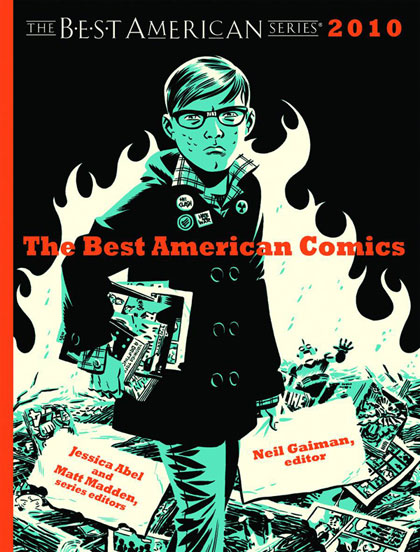
An angry adolescent peers at you while a fire rages behind him. He seems to say, "Burn my comics, will you? Fine! I'll burn down your house!"
Alas, the house seems to be his family's, so it's actually his house too, but his defiance is undeniable.
And that, my friends, describes the cover and the reading experience that is Best American Comics 2010. Edited by Neil Gaiman, the anthology has interesting pieces that are accessible to a reader but that push away, as if to suggest, "I'm complicated!" when one considers why Gaiman made his choices.
Of course, this line of thinking suggests a sort of "cult of the superstar" surrounding Gaiman, but that's part of the fun of this series: seeing who the new editor is, being impressed, then seeing what he or she thinks makes the grade for inclusion.
Series editors Jessica Abel and Matt Madden suggest a Golden Age of comics accessibility, and Gaiman's introduction plays off the comment by mentioning that a CIA study suggests that "comics are the easiest way to assimilate information." Gaiman soon adds pull to push, though, mentioning Lynda Barry's previous Best American Comics sentiments that comics are democratic while anthologies are by nature discriminatory, especially one that asks its editor to consider what "American" means alongside "best."
That's not to suggest he's complaining. Gaiman simply wants his audience to feel a bit of his experience and to realize that push and pull are the guiding dynamic of his work for the series.
I suspect we can see that in the first two selections as well. I honestly think that Gaiman probably wanted to lead with "Ceci N'est Pas une Comic" but decided it would be too politically scathing a start, thereby helping a section from Lethem and Dalrymple's Omega the Unknown occupy the first pages.
Standouts include Lilli Carre's excerpt from The Lagoon, which interjects magical realism in a section with lots of slice-of-life entries, and Ames and Haspeil's excerpt from The Alcoholic, which is bound to be cited in thesis upon thesis on comics and 9/11.
The excerpts from Asterios Polyp, Genesis, and A.D. New Orleans After the Deluge seemed to be obligatory, as did the short from Scott Pilgrim, but that's sort of the joy in seeing them in there. Gaiman gets to play with commercial successes and critical successes as he sees fit. And throwing in a little name recognition vis a vis the movies can't hurt, right?
I can't help but see Gaiman throwing papers around a small room, nerve-wracked, saying to himself, "I can't not put so-and-so in there! Look at the press and notoriety they've gained this year! It's good for the medium! And isn't '2010' in the title to the damn thing??" :)
The story that surprised me the most was "The Bank," which, based on the art, I thought I would hate, but I ended up enjoying the 1980's tale of The Clash and other main characters, um, clashing and pulling against the push of popular music. The hyper-charged vibe from that text, which oozes a sort of 80s masculinity, is aptly juxtaposed with Chris Ware's sniveling sad sack entry from the Acme Novelty Library.
Note to Chris: They do make other types of men worthy of being a main character! ;)
I also enjoyed the sweet "Lobster Run" more than I expected and appreciated the reintroduction to Fred Chao, who is more diverse an artist than I've considered. The push of that action-driven love story is balanced by the pull of the next selection, which also explores the theme of intimacy, but via two homosexual males meeting for drinks after calling it quits. "Ex Communication" is endearing in its difference to the text that precedes it but similar enough in theme that this section flows well, possibly even adding more sentimentalism to a reading of "Norman's Left Arm," the story following these two, than is necessary.
Of all the selections, only Michael Cho's "Trinity" made me rush to the front matter to learn what larger collection it was part of (but this is because I had already read many of the other texts excerpted). I absolutely must learn more about Taddle Creek and appreciated finding a story that spoke to my generation's concept of modernity and progress and fear. "Trinity" would have made an excellent juxtaposition with "The Alcoholic" in that both texts together, perhaps along with "Ceci N'est Pa," illustrate the defining anxieties of those born pre- 9/11 and those born near or afterwards and just how different the definitive worries are for folks of a certain era in comparison with younger folks' zeitgeist stresses. Placing those texts one after the other would have been too obvious a choice, though, and having them scattered away from one another allows for a consideration of theme and sub-theme in a way that having them in sequence would have cheapened.
Completing the anthology is another short from Chris Ware which sums up the tensions of the text while also contemplating the fissures of fiction and nonfiction, the comics form, and even a little bit of life itself. "Fiction Versus Nonfiction" plays with memory, representation, meaning- making, and the various joys of reading. Ware reminds us of the interplay, the push and pull of being known and being foreign, of being real and... not quite...
Who better to have assimilated a collection of such texts than the man who knows how to mine that space better than almost any other? Make no mistake, Gaiman knows what he is doing, and the end result is another intriguing edition of the Best American Comics series.

No comments:
Post a Comment